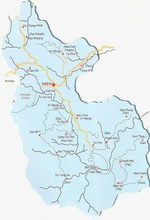

Ta Van village

Ta Van is a small village set within a picturesque valley not far from the
northern Vietnamese mountain resort of Sa Pa. The area is renowned for its colourful ethnic minorities, and Ta Van is home to two such groups. A stay with one of the farmer families here will give you a close-up experience of the life-style and culture typical of the area. Trekking in the surrounding area is most satisfying, including access to a
3-day route up Mount Fan Si Pan, to the highest point in Indo-China, at 3.143 m.
A picturesque hamlet surrounded by terraced rice fields, Ta Van Day has become a new
tourist attraction in Sa Pa. The name originated because it is home primarily to Day ethnic people who have been living together since long with amity and unity. So far, this is the sole hamlet in the commune of
Ta Van providing homestay facilities. A stay with local families will help you get to know about rural village life in the North-West of
Vietnam as well as enjoy the cozy atmosphere of a Day peasant family.
Just a short distance from Sa Pa, the atmosphere in Ta Van quite different. It is not active, without luxurious hotels, restaurants, and high-rise buildings. Simply, it is a quiet place for relaxation and isolation from daily busy life. You will stay in brick-roofed houses with earth floor on the mountainsides amidst terraced rice fields and primitive scenery. Yet so peaceful that you feel you are in quite different world. Perhaps, that is why visitors are especially interested in this destination. Not only you can admire the beautiful landscape, but you also can live the daily life of Day people during your stay at their homes. Again, you can feel relaxed, the peace of mind and have affection for the hospitality, warm reception and sincerity of the locals.
Expectations of community-based tourism in Ta Van are high. Homestay tourism provides an important supplement to their incomes. Your stay there will cost very little but it will put money straight into the pockets of the poor residents of this village. Over the past years, the locals have become familiar with this new type of tourism. Ma A Lu, Chairman of the communal People's Committee was quoted by saying: 'Before, people in Ta Van Day had no idea about tourism. Thus, the local tourism administration and authorities have delivered training for homestay operators in the rules of conduct, the culture and way of doing business, and most importantly how to make foreign visitors to pleased and to wish to come back. Additionally, the households have been assisted through a Swedish-Vietnamese project for gender equality. It is expected that by making the most of its available resources, Ta Van's people will help visitors find out more about the land, culture and local people.
Just a short distance from Sa Pa, the atmosphere in Ta Van quite different. It is not active, without luxurious hotels, restaurants, and high-rise buildings. Simply, it is a quiet place for relaxation and isolation from daily busy life. You will stay in brick-roofed houses with earth floor on the mountainsides amidst terraced rice fields and primitive scenery. Yet so peaceful that you feel you are in quite different world. Perhaps, that is why visitors are especially interested in this destination. Not only you can admire the beautiful landscape, but you also can live the daily life of Day people during your stay at their homes. Again, you can feel relaxed, the peace of mind and have affection for the hospitality, warm reception and sincerity of the locals.
Expectations of community-based tourism in Ta Van are high. Homestay tourism provides an important supplement to their incomes. Your stay there will cost very little but it will put money straight into the pockets of the poor residents of this village. Over the past years, the locals have become familiar with this new type of tourism. Ma A Lu, Chairman of the communal People's Committee was quoted by saying: 'Before, people in Ta Van Day had no idea about tourism. Thus, the local tourism administration and authorities have delivered training for homestay operators in the rules of conduct, the culture and way of doing business, and most importantly how to make foreign visitors to pleased and to wish to come back. Additionally, the households have been assisted through a Swedish-Vietnamese project for gender equality. It is expected that by making the most of its available resources, Ta Van's people will help visitors find out more about the land, culture and local people.





